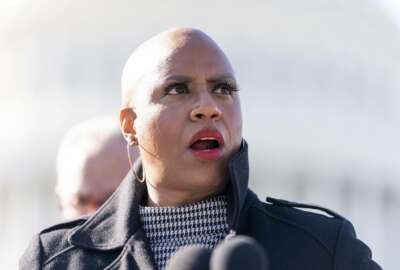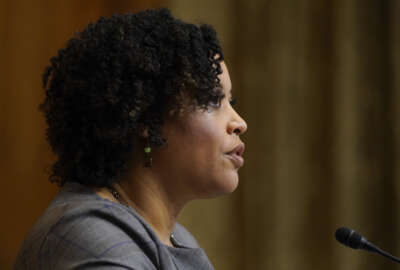CDO Council sees administration’s equity goals increase demand for data
Chief data officers are relatively new additions to most agencies, but the Biden administration sees them as an essential part of some of its top priorities.
Nearly two years after holding its first meeting, the Chief Data Officers Council is seeking input on how to meet its mission.
The council, as part of its request for information issued this week, is asking the public how best to upskill federal employees for data literacy. The council is also seeking best practices on how to inventory agency data, and share federal data between agencies while still upholding privacy.
Meanwhile, the council is putting together a CDO playbook, focused on maximizing the impact of CDOs at their agencies.
Chief data officers are relatively new additions to most agencies, but the Biden administration sees them as an essential part of some of its top priorities.
The CDO Council held its first public meeting Thursday and gave a status update on progress made under the Federal Data Strategy. The council, since holding its first meeting in January 2020, has stood up working groups focused on data workforce skills, data sharing, data inventories and stakeholder engagement.
Deputy Federal CIO Maria Roat, speaking at the recent CDO Council meeting, said the Federal Data Strategy set a 10-year vision for agencies to use data to drive decision-making and better serve the public, and that CDOs are making significant progress.
“They have come out of the gate running, establishing working groups and really initiating on a lot of activity across the federal government,” Roat said.
The Biden administration also set up an Equitable Data Working Group as part of an executive order on promoting racial equity through the federal government.
The Equitable Data Working Group is reviewing inadequacies in existing federal data collection activities, as well as infrastructure and policies.
But Dominic Mancini, the deputy administrator of OMB’s Office of Information and Regulatory Affairs, says CDOs are doing the day-to-day work to meet the administration’s goals.
“We are really in the business of trying to put a spotlight on the need for both more access to the data, information relevant to equity, while maintaining confidentiality. That will be an inherently more sensitive data set if you think about what the kinds of underserved populations and the information we may want from them. And so really, that comes down to trust, it comes down to maintaining the infrastructure of data policy within the government,” Mancini said.
CDO Council chairman Ted Kaouk said agencies are looking at ways to better leverage their data to make progress on some of the administration’s biggest goals, including COVID-19 recovery, climate change and equity in government.
Kaouk says all of those administration goals require better data management, as well as investments in federal workforce training and infrastructure.
“Recent executive orders of the Biden-Harris administration really reinforced the need for quality data to tackle some of the nation’s biggest challenges, and again, signal that holistic reexamination of the federal government’s practices for collecting, using, sharing and disseminating data,” Kaouk said.
Dan Morgan, the Transportation Department’s CDO who leads the council’s working group on data sharing, said agencies don’t just need to get their own data in order. They also need to work together and share data to accomplish some of the administration’s biggest priorities.
“If you’ve been following the administration’s Equitable Data Working Group, you’ll know that data sharing is a key piece of what it will take for us to be able to gather more and better granular data about socio-demographic groups that are of interest to us or our concern, so that we can direct federal resources in the most productive way possible,” Morgan said.
Kaouk currently serves as the CDO for the Agriculture Department, but later this month will move to the Office of Personnel Management to become its CDO and deputy director for human capital data management and modernization.
Kaouk said agencies must also improve data maturity as artificial intelligence and machine learning tools gain more widespread acceptance in government.
“There are many emerging opportunities to improve the use of data, but this must also be accomplished with a focus on ethical data practices, and strong privacy protections that reduce the risk of re-identification to give added confidence to our data sharing and dissemination activities,” Kaouk said.
The council worked across agencies earlier in the pandemic to share data held by the Centers for Disease Control and the rest of the Department of Health and Human Services more easily with the rest of the government.
Kaouk said this work also helped CDOs better understand how to set up shared data infrastructure across multiple agencies on urgent issues.
‘The role of a CDO is to make things happen’
Despite this progress, CDOs are running into a few common hurdles, like making sure the federal workforce has the necessary data skills, as well as a baseline data literacy.
Thomas Beach, the Commerce Department’s interim CDO and head of the council’s working group on the workforce, said agencies need a convergence of IT skills, data and analytics skills, business expertise and “soft skills” from their workforce to meet the Federal Data Strategy’s goals.
But Beach says agencies will need a range of data expertise from its workforce.
“We’re not in government trying to make everyone a data scientist. We’re tackling this concept of data skills in the most holistic definition, meaning there are those that have a certain level of data acumen, all the way to the executive leadership that has a certain level of data acumen, and then everything in between, with the expertise creating, and the expertise around visualization and data storytelling,” Beach said.
Beach said the council is drafting a CDO playbook looking at where CDOs should focus most of their effort to maximize impact in the short and long term.
“The role of a CDO is to make things happen, to figure it out and create outcomes. It’s not just to define things and to use buzzwords like data management and governance and things like that. It’s really to say, ‘OK, what can we really make happen?’” Beach said.
Tod Dabolt, the Interior Department’s CDO, serves as the head of the data inventory working group. He said agencies are working towards marketing more of their data for commercial use.
“More and more, we see the value of government data in the commercial sector, both in regulated entities, as well as the tech and data sectors, huge growth in taking data through organizations like the Department of Commerce, and the National Weather Service, and adding additional value to that data, and serving it back in the form of enhanced weather capabilities,” Dabolt said.
But part of that challenge is making agency data easily accessible and easily searchable. Dabolt says users don’t want to have to search multiple platforms to find data from a single agency.
“I don’t want to go to the [U.S. Geological Survey] or the Fish and Wildlife Service and navigate through their website to find a piece of data to answer a policy discussion or inform a policy discussion. you just want to search for it. You don’t want to go across multiple platforms, you don’t want to learn multiple interfaces. And you don’t want to have a login for this site, and that site and this site, just to find a piece of government information,” Dabolt said.
Copyright © 2025 Federal News Network. All rights reserved. This website is not intended for users located within the European Economic Area.
Jory Heckman is a reporter at Federal News Network covering U.S. Postal Service, IRS, big data and technology issues.
Follow @jheckmanWFED






